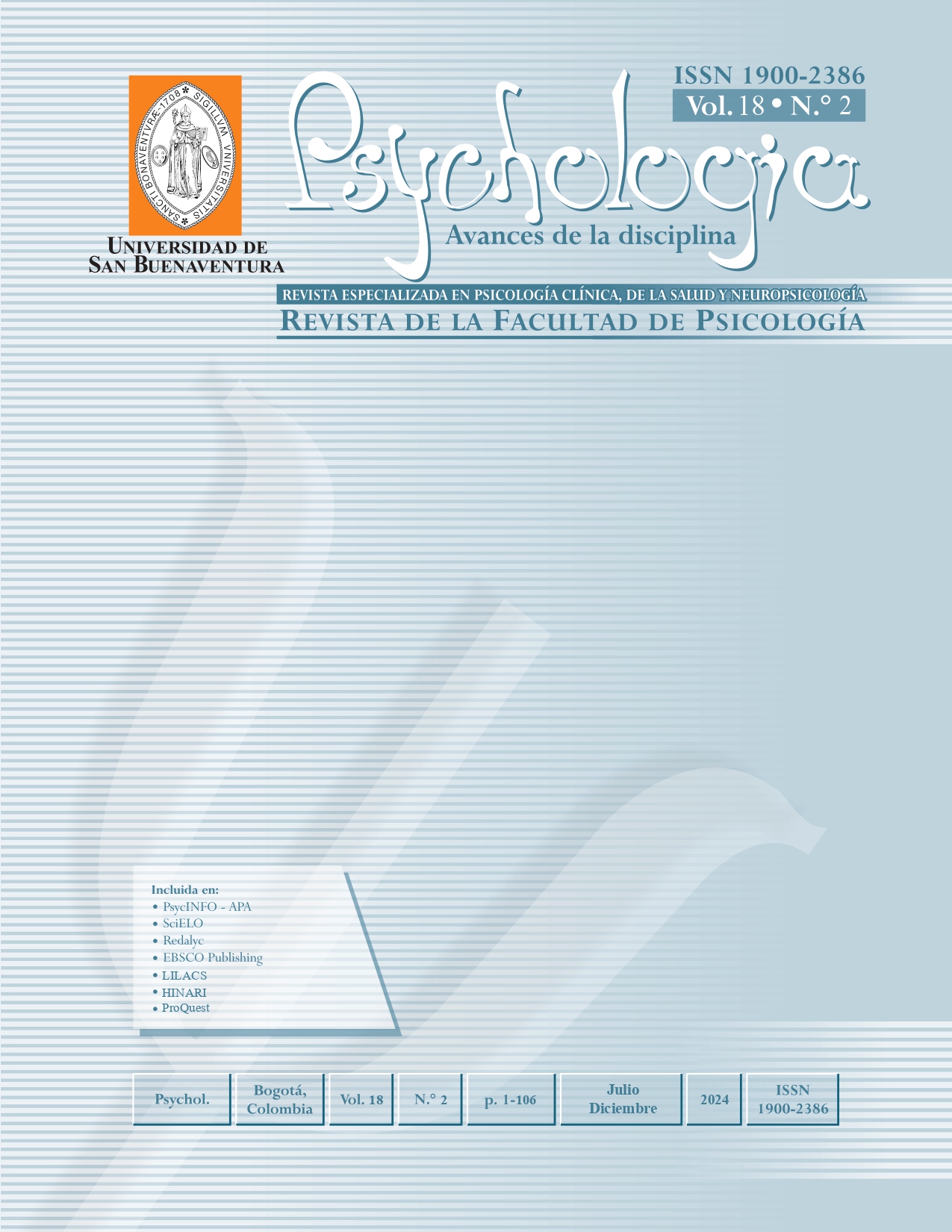This journal provides open, immediate access to its contents, based on the principle that offering the public free access to research helps to promote a higher global exchange of knowledge.
As such, all journal articles are published under a Creative Commons Attribution-NonCommercial-ShareAlike 4.0 International License (CC BY-NC-SA), by which commercial use of the original work or its possible derived works is not allowed, and the distribution thereof must be done with the same license elements regulating the original work.
http://creativecommons.org/licenses/by-nc-sa/4.0/
Abstract
The research aimed to understand the experiences around sexuality, from the holon theory, in a group of women diagnosed with gynecological cancer from Pereira, Colombia. A qualitative and phenomenological design was carried out, with the participation of six women between 30 and 60 years of age, to whom semi-structured interviews were applied, exploring the holons of reproductivity, gender, eroticism and interpersonal affective bonding. The interviews were transcribed and analyzed manually, using open and axial coding to identify emerging categories. In the women's discourses, elements related to the holons of sexuality were evident. In the holon of reproductivity, a resignification of the reproductive role as mothers was found; in the holon of gender, positive attitudes towards their bodies and threats to gender identity due to the changes caused by the disease were presented; in the holon of eroticism, women reported sexual experiences characterized by pain and erotic support from their partners; and in the holon of affective interpersonal bonding, they reported situations of marital stability, temporary separation from their partners and abusive ties during the process of cancer treatment. These findings show a comprehensive reconfiguration of female sexuality in each of the holons and make a significant contribution to the understanding of women's subjectivities in the process of coping with gynecological cancer. Further research with a larger number of participants and in other regions of Colombia is recommended.
Keywords:
References
Aguilar, T. (2008). El sistema sexo-género en los movimientos feministas. Amnis, 8. https://doi.org/10.4000/amnis.537.
Arévalo, L., & Correa, L. (2008). Abordaje de enfermería a la paciente con cáncer ginecológico interpretado a partir de la teoría de los holones de la sexualidad (Tesis de posgrado, Pontificia Universidad Javeriana). http://hdl.handle.net/10554/55100.
Boding, S.A., Hutchinson, A., & Webb, S. N. (2023). Factors that influence self-identity in women who have undergone gynecological cancer treatment. Women’s Reproductive Health (Philadelphia, Pa.), 10(3), 402-419. https://doi.org/10.1080/23293691.2022.2124139.
Boscher, C., Joly, F., Clarisse, B., Humbert, X., Grellard, J. M., Binarelli, G., Tron, L., Licaj, I., & Lange, M. (2020). Perceived Cognitive Impairment in breast cancer survivors and its relationships with psychological factors. Cancers, 12(10), 3000. https://doi.org/10.3390/cancers12103000.
Carter, J., Stabile, C., Gunn, A., & Sonoda, Y. (2013). The physical consequences of gynecologic cancer surgery and their impact on sexual, emotional, and quality of life issues. The Journal of Sexual Medicine, 10(1), 21-34. https://doi.org/10.1111/jsm.12002.
Cassedy, H. F., Tucker, C., Hynan, L. S., Phillips, R., Adams, C., Zimmerman, M. R., Pitts, S., Miltenberger, P., & Stringer, C. A. (2018). Frequency of psychological distress in gynecologic cancer patients seen in a large urban medical center. Proceedings (Baylor University. Medical Center), 31(2), 161-164. https://doi.org/10.1080/08998280.2018.1440857.
Chen, J., You, H., Liu, Y., Kong, Q., Lei, A., & Guo, X. (2021). Association between spiritual well-being, quality of life, anxiety and depression in patients with gynaecological cancer in China. Medicine, 100(1), e24264. https://doi.org/10.1097/md.0000000000024264.
Cuevas, U., Díaz A., L., Espinoza M., F., & Garrido P., C. (2019). Depresión y Ansiedad en mujeres histerectomizadas no oncológicas posterior a la cirugía. Revista Chilena de Obstetricia y Ginecología, 84(3), 245-256. https://doi.org/10.4067/s0717-75262019000300245.
De la Espriella, R., & Gómez, C. (2020). Teoría fundamentada. Revista Colombiana de Psiquiatría, 49(2), 127-133. https://doi.org/10.1016/j.rcp.2018.08.002.
Eaton, L., Kueck, A., Maksut, J., Gordon, L., Metersky, K., Miga, A., Brewer, M., Siembida, E., & Bradley, A. (2017). Sexual health, Mental Health, and Beliefs About Cancer Treatments Among Women Attending a Gynecologic Oncology Clinic. Sexual Medicine, 5(3), e175-e183. https://doi.org/10.1016/j.esxm.2017.04.002.
Faccio, F., Mascheroni, E., Ionio, C., Pravettoni, G., Alessandro Peccatori, F., Pisoni, C., Cassani, C., Zambelli, S., Zilioli, A., Nastasi, G., Giuntini, N., & Bonassi, L. (2020). Motherhood during or after breast cancer diagnosis: A qualitative study. European Journal of Cancer Care, 29(2). https://doi.org/10.1111/ecc.13214.
Fernández, M. S., Ospina, B., & Múnera, A. M. (2002). La sexualidad en pacientes con cáncer de mama o cérvix sometidas a tratamiento quirúrgico en el Hospital General, Hospital San Vicente de Paúl e Instituto de Cancerología de la Clínica las Américas, Medellín, 1999. Revista colombiana de obstetricia y ginecologia, 53(2), 179-183. https://doi.org/10.18597/rcog.648.
Funston, G., O’Flynn, H., Ryan, N. A. J., Hamilton, W., & Crosbie, E. J. (2018). Recognizing gynecological cancer in primary care: Risk factors, red flags, and referrals. Advances in Therapy, 35(4), 577-589. https://doi.org/10.1007/s12325-018-0683-3.
Fuster, D. (2019). Investigación cualitativa: Método fenomenológico hermenéutico. Propósitos y Representaciones, 7(1), 201-229. http://dx.doi.org/10.20511/pyr2019.v7n1.267.
Graf, J., Junne, F., Ehrenthal, J. C., Schäffeler, N., Schwille-Kiuntke, J., Stengel, A., Mehnert-Theuerkauf, A., Marwedel, L., Brucker, S. Y., Zipfel, S., & Teufel, M. (2020). Unmet supportive care needs among women with breast and gynecological cancer: Relevance of attachment anxiety and psychological distress. Frontiers in psychology, 11. https://doi.org/10.3389/fpsyg.2020.558190.
Gutiérrez, R. L. (2021). Entrevistas estructuradas, semi-estructuradas y libres: Análisis de contenido. En J. Tejero (Ed.), Técnicas de investigación cualitativa en los ámbitos sanitario y sociosanitario (pp. 65-83). Ediciones de la Universidad de Castilla-La Mancha.
Huffman, L. B., Hartenbach, E. M., Carter, J., Rash, J. K., & Kushner, D. M. (2016). Maintaining sexual health throughout gynecologic cancer survivorship: A comprehensive review and clinical guide. Gynecologic Oncology, 140(2), 359-368. https://doi.org/10.1016/j.ygyno.2015.11.010.
Instituto Nacional de Cancerología. (2023). Cáncer de cuello uterino. https://www.cancer.gov.co/conozca-sobre-cancer-1/informacion-sobre-cancer-para-pacientes/tipos-cancer/cancer-cuello-uterino.
Klapheke, A. K., Keegan, T. H., Ruskin, R., & Cress, R. D. (2020). Depressive symptoms and health-related quality of life in older women with gynecologic Cancers. Journal of Geriatric Oncology, 11(5), 820-827. https://doi.org/10.1016/j.jgo.2019.10.001.
Korenaga, T., & Tewari, K. S. (2020). Gynecologic cancer in pregnancy. Gynecologic Oncology, 157(3), 799-809. https://doi.org/10.1016/j.ygyno.2020.03.015.
Lamas, M. (1999). Género, diferencias de sexo y diferencia sexual. Debate feminista, 20, 84-106. http://www.jstor.org/stable/42625720.
Levinson, K. L., Jernigan, A. M., Flocke, S. A., Tergas, A. I., Gunderson, C. C., Huh, W. K., Wilkinson-Ryan, I., Lawson, P. J., Fader, A. N., & Belinson, J. L. (2016). Intimate partner violence and barriers to cervical cancer screening: A gynecologic oncology fellow research network study. Journal of Lower Genital Tract Disease, 20(1), 47-51. https://doi.org/10.1097/lgt.0000000000000153.
Ministerio de Salud y Protección Social de Colombia. (1993). Resolución 8430 de 1993. Por la cual se establecen las normas científicas, técnicas y administrativas para la investigación en salud. 4 de octubre de 1993. https://www.minsalud.gov.co/sites/rid/Lists/BibliotecaDigital/RIDE/DE/DIJ/RESOLUCION-8430-DE-1993.PDF.
Organización Mundial de la Salud. (2006). Salud sexual. https://www.who.int/es/health-topics/sexual-health#tab=tab_1.
Organización Mundial de la Salud. (2023). Cáncer de cuello uterino. OMS. https://www.who.int/es/news-room/fact-sheets/detail/cervical-cancer.
Rasmusson, E., & Thomé, B. (2008). Women’s wishes and need for knowledge concerning sexuality and relationships in connection with gynecological cancer disease. Sexuality and Disability, 26(4), 207-218. https://doi.org/10.1007/s11195-008-9097-5.
Rieck, G., & Fiander, A. (2006). The effect of lifestyle factors on gynaecological cancer. Best Practice & Research. Clinical Obstetrics & Gynaecology, 20(2), 227-251. https://doi.org/10.1016/j.bpobgyn.2005.10.010.
Roberts, K., Chong, T., Hollands, E., Tan, J., Mohan, G., & Cohen, P. A. (2020). Screening for sexual health concerns in survivors of gynecological cancer. Supportive Care in Cancer: Official Journal of the Multinational Association of Supportive Care in Cancer, 28(2), 599-605. https://doi.org/10.1007/s00520-019-04872-4.
Roberts, M. E., Baldwin, L. A., Lefringhouse, J., Ore, R. M., Johnson, M. S., Miller, R. W., Desimone, C. P., Ueland, F. R., Pavlik, E. J., & Coker, A. L. (2016). Intimate partner violence and time to first treatment in women with gynecologic or breast cancer. Gynecologic Oncology, 141(1), 157. https://doi.org/10.1016/j.ygyno.2016.04.410.
Roussin, M., Lowe, J., Hamilton, A., & Martin, L. (2021). Factors of sexual quality of life in gynaecological cancers: a systematic literature review. Archives of Gynecology and Obstetrics, 304(3), 791–805. https://doi.org/10.1007/s00404-021-06056-0.
Rubio, E. (1994). Introducción al estudio de la sexualidad humana: Conceptos básicos en sexualidad humana. En C. Pérez Fernández (coord.), Antología de la Sexualidad Humana (pp.17-46). Miguel Ángel Porrúa.
Silva, M. A. (2017). Importancia de una intervención psicoeducativa sobre sexualidad en mujeres sometidas a una histerectomía. Una revisión de la literature. Revista Chilena de Obstetricia y Ginecologia, 82(6), 666-674. https://doi.org/10.4067/s0717-75262017000600666.
Temkin, S. M., Rimel, B. J., Bruegl, A. S., Gunderson, C. C., Beavis, A. L., & Doll, K. M. (2018). A contemporary framework of health equity applied to gynecologic cancer care: A Society of Gynecologic Oncology evidenced-based review. Gynecologic Oncology, 149(1), 70-77. https://doi.org/10.1016/j.ygyno.2017.11.013.
Uceda-Escobar, A., Guerra-Martín, M. D., & Botello-Hermosa, A. (2023). The perceptions of women with gynecological cancer after radiotherapy treatment: A gender-based qualitative study. Healthcare (Basel, Switzerland), 11(11), 1580. https://doi.org/10.3390/healthcare11111580.
Willis, E., King, D., Dwyer, J., Wainer, J., & Owada, K. (2017). Women and gynaecological cancer: Gender and the doctor–patient relationship. Topoi: An International Review of Philosophy, 36(3), 509-519. https://doi.org/10.1007/s11245-015-9349-9.
Wilson, C. M., McGuire, D. B., Rodgers, B. L., Elswick, R. K., & Temkin, S. M. (2021). Body image, sexuality, and sexual functioning in women with gynecologic cancer: An integrative review of the literature and implications for research. Cancer Nursing, 44(5), 252-286. https://doi.org/10.1097/ncc.0000000000000818





















